Best 12 Intercom alternatives
Your customer service solution ultimately defines the effectiveness of your agents and strategy. Intercom is a popular solution that many businesses gravitate toward for its advanced features. However, with the number of customer service solutions available on the market today, it’s better not to put all your eggs in one basket.
Use this guide for Intercom alternatives to compare some of the most popular customer service solutions available and find the best fit for your customers, agents, and budget.
Pro Tip
Elevate customer service with Jotform AI Agents by automating real-time support, personalizing interactions, and seamlessly scaling across multiple channels, while gathering data and providing voice-based assistance.
What is Intercom?
Intercom is an AI-first customer service platform. For customers, Intercom specializes in AI-driven service with its AI support agent, Fin. Intercom’s AI agent offers human-quality service through its chatbot interface.
For agents, Intercom provides AI-powered tools to help improve your team’s efficiency. You’ll also get essential customer service solutions such as basic chatbots, shared inboxes, ticketing systems, and more.
Intercom plans and pricing
There are three core Intercom plans, each with an escalating set of available features. Keep in mind that the prices listed for these plans are the discounted rates you would receive for billing annually — with rates increasing for a monthly plan:
- Essential: Starting at $29 per seat per month, this plan offers features such as basic chatbots, ticketing systems, live chat, report builder, and more.
- Advanced: Starting at $85 per seat per month, this plan includes all essential features, plus new capabilities such as social channels, workflow automation, and multiple team inboxes.
- Expert: Starting at $132 per seat per month, this plan includes all the base features available in the Intercom platform, such as workload management, multiple help centers, customer roles, and SSO and identity management.
However, while all these plans can integrate with the Fin AI Agent, the capabilities of this feature are not included in the base pricing. To use Fin’s customer-facing capabilities, you must pay an additional $0.99 per resolution. While you only pay for the resolved interactions, this additional feature can rapidly increase the price of your plan.
For unlimited usage, Fin’s agent-facing AI capabilities will also cost you an additional fee of $29 per month per agent. Each plan includes free use for up to 10 tickets per agent per month, but any additional use will require you to purchase an unlimited plan.
Some of Intercom’s communication channels require an additional fee to use as well:
- Outbound email campaigns range from $0.00025 to $0.045 per email sent, with your price per email dropping as volume increases.
- SMS messaging costs anywhere from $0.01 to $0.09 per SMS sent or received, depending on volume and region.
- WhatsApp messaging costs anywhere from $0.03 to $0.10 per conversation, depending on volume or bulk options.
- Phone support is more complex, with prices starting at $0.012 per minute. Phone capabilities are also limited based on which core plan you choose.
Intercom’s pricing structure can be complex depending on the features you plan to use. Knowing the features you want to leverage can simplify this process when it comes time to buy.
Intercom key features
Intercom sets itself apart from other solutions with its AI-first approach to customer service. However, AI isn’t the only capability Intercom offers. Other core features include:
- Fin AI Agent
- AI Copilot
- Proactive support tools such as chats, banner messages, and tooltips
- Customer service communication channels, including live chat, email, social, SMS, WhatsApp, and phone support
- Analytics reporting
- Data customizations
- Helpdesk tools such as a chatbot, ticketing system, shared inbox, and more
Intercom’s wide range of features and prioritization of AI make it a favorite among customer service teams around the world, driving positive customer feedback.
What are Intercom’s G2 ratings?
While a customer service solution might check all your boxes on paper, it’s important to consult the experiences and opinions of users who have already used the software. One of the most popular sites to find customer feedback on digital solutions is G2. Intercom’s current G2 rating is 4.5 out of 5 stars.
Despite that largely positive rating, Intercom has its flaws just like any other platform. Here are a few reasons you may want to shop around for Intercom alternatives.
Why should you consider Intercom alternatives?
Although Intercom has a wide range of advanced features that could improve and streamline your customer service strategy, the platform has potential drawbacks as well:
- Complex and expensive pricing
- Paywalled AI features
- Limited communication channels
- No free version
Before making your final decision, consider some Intercom alternatives that might meet your needs more seamlessly.
| Name | Key features | Pricing range |
|---|---|---|
| Jotform | User-friendly form builder, workflow automation, data storage, report building, AI tools, CRM integrations | Free to $99/user/mo |
| Zendesk | Messaging and live chat, AI and automation tools, advanced ticketing system, user interface customization | $19 to $115/user/mo |
| Zoho Desk | Zia contextual AI, agent productivity tools, omnichannel communication, self-service solutions | Free to $40/user/mo |
| Freshdesk | Advanced ticket management, unified agent workspace, self-service tools, helpdesk AI | Free to $79/user/mo |
| Salesforce Service Cloud | AI agents, self-service, customer service automation and management, intelligent service operations | $25 to $500/user/mo |
| HubSpot Service Hub | HubSpot Playbooks, CRM integration, knowledge base, ticketing system, live chat and chatbots | Free to $150/mo/seat with an onboarding fee of $1,500 to $3,500 |
| HappyFox | Ticketing system, canned actions and responses, task management, reporting, knowledge base | Agent plan: $9 to $89/agent/moUnlimited plan: $1,599 to $4,799/mo |
| Olark | Live chat, chatbots, chat analytics, automation tools, team management, custom in-chat forms | $29/mo/seat or custom pricing for Pro plan |
| HelpCrunch | Live chat, chatbot, shared inbox, email marketing, knowledge base, HelpCrunch AI | $12 to $20/user/mo or $495/mo for unlimited users |
| Crisp | AI chatbots, live chat, shared inboxes, CRM, chat widget, ticketing system, campaign management | Free to $295/mo/workspace |
| Tidio | Advanced live chat, workflow automation, Lyro AI chatbot, order management, ticketing | Limited plans: $29 to $59/moCustom plan: $749 to $2999/mo |
| Kustomer | AI agents, CRM, omnichannel, self-service, workflow automation, integrations | Agent-based: $89 to $139/user/moUsage-based: Custom pricing |
What are the top 12 Intercom alternatives?
1. Jotform
Designed with ease of use in mind, Jotform is an all-in-one solution that streamlines the way your team approaches customer service management. With the help of Jotform’s industry-leading form builder, you can easily manage essential customer service tasks.
Using the form builder, you can create forms that help register new customers, offer discounts to loyal shoppers, collect user feedback about products or services, or perform general customer outreach. You can even collect specific responses from any device, such as Net Promoter Score® (NPS®) results, using custom solutions like Jotform’s easy-to-use NPS survey builder.
Jotform can also help you streamline your customer feedback collection process. The Jotform form template gallery features more than 700 feedback form templates that will reduce the time your team spends building out these essential tools from scratch. Once you build your forms, you can program them to distribute automatically using conditional logic, which triggers a form to be sent once a specific action has been completed by a customer
To help maintain your customer request management system, you can set up custom automatic email notifications to alert your agents when customers submit a complaint or service request form.
Once you’ve collected the customer data you need most, compile custom analytics in the Jotform Report Builder. These reports allow you to analyze data from submitted forms to improve service, track common issues, and monitor resolution times.
Jotform can also enhance your current tech stack with its extensive catalog of integrations. For example, you can integrate Jotform with your customer relationship management (CRM) tools to ensure customer service data is accessible and actionable.
Key features: User-friendly form builder, workflow automation, data storage, report building, AI tools, CRM integrations
Plans/Pricing: Jotform’s full suite of features is available for free, but its paid plans elevate these features:
- Bronze: $34 per user per month
- Silver: $39 per user per month
- Gold: $99 per user per month
- Enterprise: Custom pricing
Pros: Easy to use, wide range of features, free version available, integrates with your existing tech stack
Cons: Not as customer service specific as other solutions, limited communication channels, lack of native CRM platform
G2 Rating: 4.7/5
Pro Tip
Improve customer service with an AI phone answering system for quicker and smoother support.
2. Zendesk
Zendesk is a leader in the customer service space, offering teams a service-oriented solution designed to enhance the customer experience. This tool provides customer service teams with the tools they need to scale operations, facilitate healthy customer interactions, and manage the behind-the-scenes work that goes into providing great service. In addition to its industry-leading solutions, users often praise Zendesk for its user-friendly interface.
Key features: Messaging and live chat, AI and automation tools, advanced ticketing system, user interface customization
Plans/Pricing: Zendesk offers three core plans and an enterprise plan with custom pricing:
- Support Team: $19 per user per month
- Suite Team: $55 per user per month
- Suite Professional: $115 per user per month
Pros: Advanced customization options, smart ticket management system, omnichannel support
Cons: Limited CRM capabilities, no free version, limited connection to other departments
G2 Rating: 4.3/5
3. Zoho Desk
Part of the greater Zoho digital suite, Zoho Desk offers customer service teams a variety of tools to help manage their customer relationships. Zoho Desk empowers agent productivity by focusing on automation, self-service, and AI. For example, Zoho Desk incorporates AI and automation into the ticketing system to automatically tag and assign tickets to relevant representatives.
Key features: Zia contextual AI, agent productivity tools, omnichannel communication, self-service solutions
Plans/Pricing: Zoho Desk offers a free version limited to three users. It also offers several paid plans with an annual billing discount, including:
- Express: $7 per user per month
- Standard: $14 per user per month
- Professional: $23 per user per month
- Enterprise: $40 per user per month
Pros: Free version, native CRM integration, interconnectivity to the Zoho suite of products
Cons: Lack of desktop application, significant user learning curve, complex user interface
G2 Rating: 4.4/5
4. Freshdesk
Freshdesk is the service arm of the Freshworks suite of products. This solution focuses primarily on the ticketing process of customer service, using tools like automation and self-service to simplify the way your team approaches ticket management. However, to access features like omnichannel communication, live chat, or a CRM, you must add other Freshworks tools to your bill.
Key features: Advanced ticket management, unified agent workspace, self-service tools, helpdesk AI
Plans/Pricing: Freshdesk offers a free version limited to two users. Paid plans include three core options:
- Growth: $15 per user per month
- Pro: $49 per user per month
- Enterprise: $79 per user per month
Pros: Free version, unified agent workplace, facilitates team collaboration
Cons: Limited capabilities, no omnichannel capabilities in base version, lower tiers lack essential features
G2 Rating: 4.4/5
5. Salesforce Service Cloud
One of the top digital business solution providers in the world, Salesforce offers users the ability to manage customer service alongside its powerful CRM capabilities. Salesforce Service Cloud offers users with a wide range of customer service features at a price to match. Out of the solutions on this list, Salesforce is one of the most expensive per agent. However, the capabilities may be worth it — particularly for existing Salesforce users.
Key features: AI agents, self-service, customer service automation and management, intelligent service operations
Plans/Pricing: Salesforce has one of the broadest pricing ranges, offering five core plans with different features available:
- Starter Suite: $25 per user per month
- Pro Suite: $100 per user per month
- Enterprise: $165 per user per month
- Unlimited: $330 per user per month
- Einstein 1 Platform: $500 per user per month
Pros: Connects to Salesforce CRM, easy for Salesforce users to learn, powerful features
Cons: Expensive to scale, limited capabilities in lower tiers, lack of AI in lower tiers
G2 Rating: 4.4/5
6. HubSpot Service Hub
An extension of a powerful CRM solution, HubSpot Service Hub is another option in the HubSpot toolbelt. This service solution allows your team to accelerate productivity with agent-empowerment solutions aimed at driving revenue and efficiency. To get the most out of this platform, it’s best if you already use HubSpot as a CRM — this will allow you to maximize the value of your data throughout your organization.
Key features: HubSpot Playbooks, CRM integration, knowledge base, ticketing system, live chat and chatbots
Plans/Pricing: HubSpot Service Hub offers two plans aimed at businesses:
- Service Hub Professional: $90 per month per seat
- Service Hub Enterprise: $150 per month per seat
HubSpot also offers a free version of its full solution, but it’s limited to two users. There’s also a steep onboarding fee of $1,500 for the Professional plan and $3,500 for the Enterprise plan.
Pros: Free version, HubSpot CRM integration, revenue and service alignment, enhanced marketing and sales integrations.
Cons: Expensive required onboarding fee, limited customization, still developing features
G2 Rating: 4.4/5
7. HappyFox
HappyFox Helpdesk is one of several service solutions offered by HappyFox. This platform is the primary base for many of its other offerings and acts as a core customer service management software. However, the core plan is limited in its advanced capabilities — access to sought-after features like chatbots, workflow automation, and AI requires you to pay for extra software in addition to the Helpdesk. While this solution is powerful on its own, taking your service to the next level will require an extra investment.
Key features: Ticketing system, canned actions and responses, task management, reporting, knowledge base
Plans/Pricing: HappyFox has two types of plans — agent-based and unlimited agents. Agent-based plans include the following:
- $9 per agent per month
- $39 per agent per month
- $89 per agent per month
- Enterprise plan with custom pricing
Unlimited plans include the following:
- $1,599 per month
- $3,199 per month
- $4,799 per month
- Ultimate plan with custom pricing
Pros: All-in-one ticket system, omnichannel communication, integration with popular solutions
Cons: Segmented pay-to-play capabilities, lack of integrated AI, lack of base chatbots
G2 Rating: 4.5/5
8. Olark
Specifically focused on chat, Olark helps your team take their customer communication to the next level. Olark’s live chat function boasts an easy-to-use interface, along with customizable features and data integration to increase your team’s efficiency. If you have an existing customer service management system and are looking to elevate chat functionality specifically, this may be your best option.
Key features: Live chat, chatbots, chat analytics, automation tools, team management, custom in-chat forms
Plans/Pricing: Olark only offers one set price plan with its Olark Standard plan at $29 per month per seat. To find out pricing for the Olark Pro plan, you will need to contact a sales representative.
Pros: Integration with popular CRMs, advanced chat features, comprehensive chat analytics
Cons: AI chatbots limited to Pro plan, narrowly focused platform
G2 Rating: 4.3/5
9. HelpCrunch
HelpCrunch is a multifaceted customer service platform centered around customer communication. This solution primarily provides your team with chat and email support, with solutions built around multichannel chat, self-service, and effective email marketing. By consolidating your communication through a shared inbox, HelpCrunch positions itself as a customer support, lead generation, and engagement platform.
Key features: Live chat, chatbots, shared inbox, email marketing, knowledge base, HelpCrunch AI
Plans/Pricing: Pricing for HelpCrunch can be configured based on your number of users and emails. But it offers three base prices:
- Basic: $12 per month per user
- Pro: $20 per month per user
- Unlimited: $495 per month with access to unlimited users
Pros: Revenue-driving features, multichannel messaging, high-rated customer support
Cons: Additional costs with high email volume, steep price jump for unlimited users
G2 Rating: 4.7/5
10. Crisp
Crisp presents itself as a messaging platform, but this customer service solution offers much more than just live chat. From its CRM solution to customer campaign tracking, this messaging platform elevates itself above more basic options by offering a wide range of additional features. It also has an affordable cost-per-user pricing plan that helps businesses scale their operations.
Key features: AI chatbots, live chat, shared inboxes, CRM, chat widget, ticketing system, campaign management
Plans/Pricing: Free version is available for up to two seats. Paid plans include:
- Mini: $45 per month per workspace with four seats
- Essential: $95 per month per workspace with 10 seats
- Plus: $295 per month per workspace with 20 seats
Pros: Free version, AI included in Essential plan, native and external CRM integration
Cons: Lack of omnichannel communication, AI not available in free or mini versions, limited features overall
G2 Rating: 4.5/5
11. Tidio
An all-in-one customer service platform, Tidio enhances your customer conversations with its chat widget tool. Where Tidio sets itself apart from other chat-focused solutions is its breadth of features. Tidio offers additional benefits like workflow automation, departmental ticket routing, order management for Shopify, and more to elevate its overall value to your team.
Key features: Advanced live chat, workflow automation, Lyro AI chatbot, order management, ticketing
Plans/Pricing: Tidio offers two limited plans:
- Starter: $29 per month
- Growth: $59 per month
Tidio also offer two custom plans:
- Plus: $749 per month
- Premium: $2,999 per month.
Pros: Multichannel communication, smart live chat features, wide range of features
Cons: Usage limits for low tiers, large price gap for full capabilities, high cost overall
G2 Rating: 4.7/5
12. Kustomer
Kustomer is a customer service platform centered around a data-driven CRM solution and omnichannel support. The tool emphasizes the value of AI features, which are driven by its AI agent — something you’ll have to pay extra to access. However, beyond AI capabilities, Kustomer provides agents access to a variety of tools like self-service, data centralization, and workflow automation to help increase efficiency.
Key features: AI agents, CRM, omnichannel, self-service, workflow automation, integrations
Plans/Pricing: Kustomer offers two main seat-based plans:
- Essential: $89 per user per month
- Ultimate: $139 per user per month
Kustomer’s usage-based plans, which offer access to unlimited seats and AI tools, require you to contact the sales team for custom pricing.
Pros: Easy-to-use interface, powerful features, AI solutions, data-driven platform
Cons: Lack of features overall, AI limited to usage-based plans, ticketing issues
G2 Rating: 4.4/5
What are the key takeaways?
Now that you understand the variety of customer service tools available on the market today, you have a better idea of whether Intercom is truly your best option. With alternatives like Jotform, you can tap into the benefits of powerful customer service without the complication of a more expensive, limited solution.
Photo by Julio Lopez
Net Promoter®, NPS®, NPS Prism®, and the NPS-related emoticons are registered trademarks of Bain & Company, Inc., NICE Systems, Inc., and Fred Reichheld. Net Promoter ScoreSMand Net Promoter SystemSMare service marks of Bain & Company, Inc., NICE Systems, Inc., and Fred Reichheld.

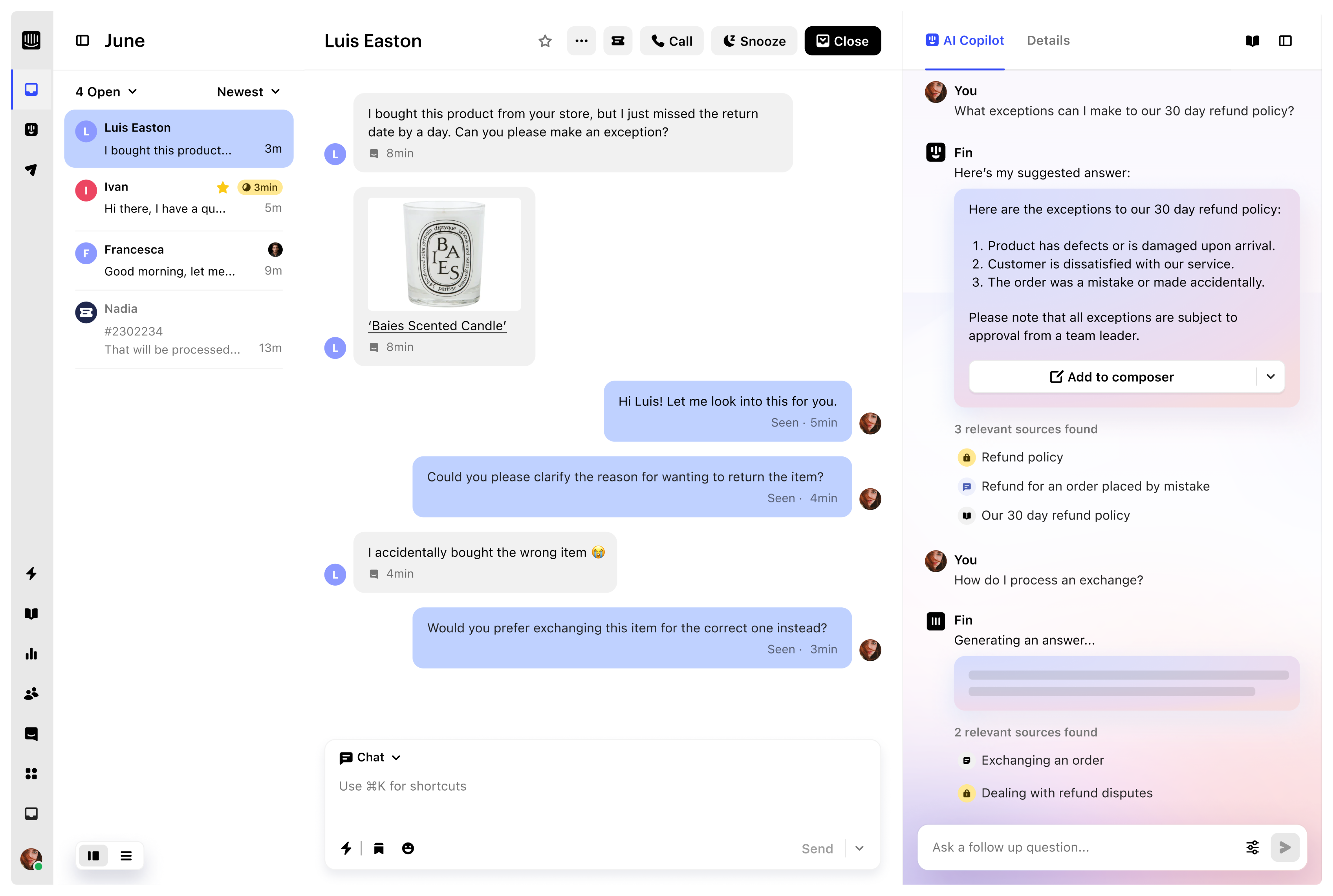
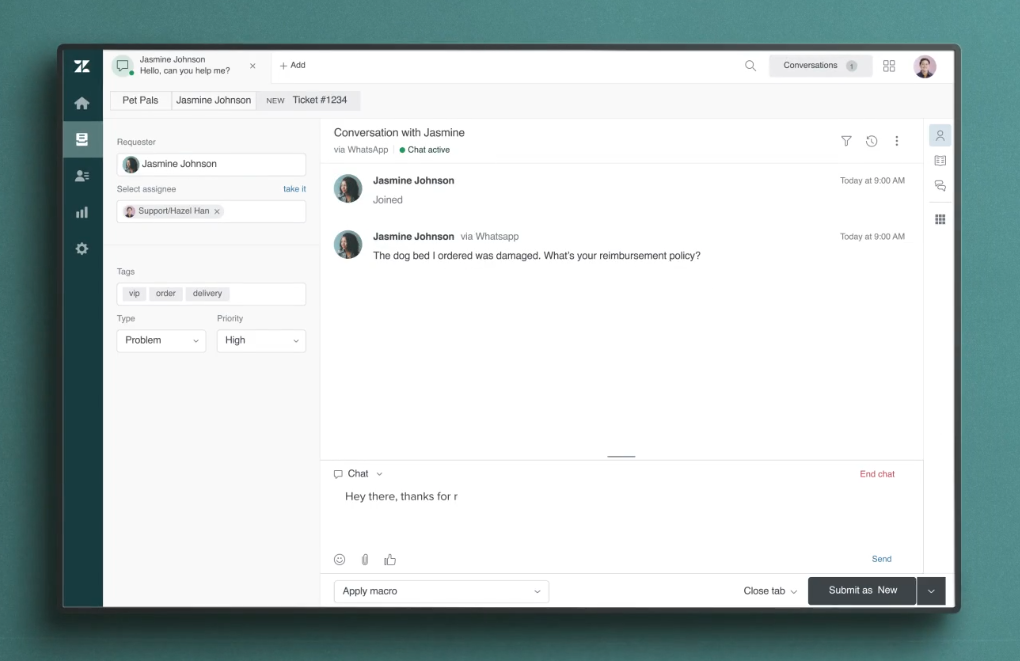
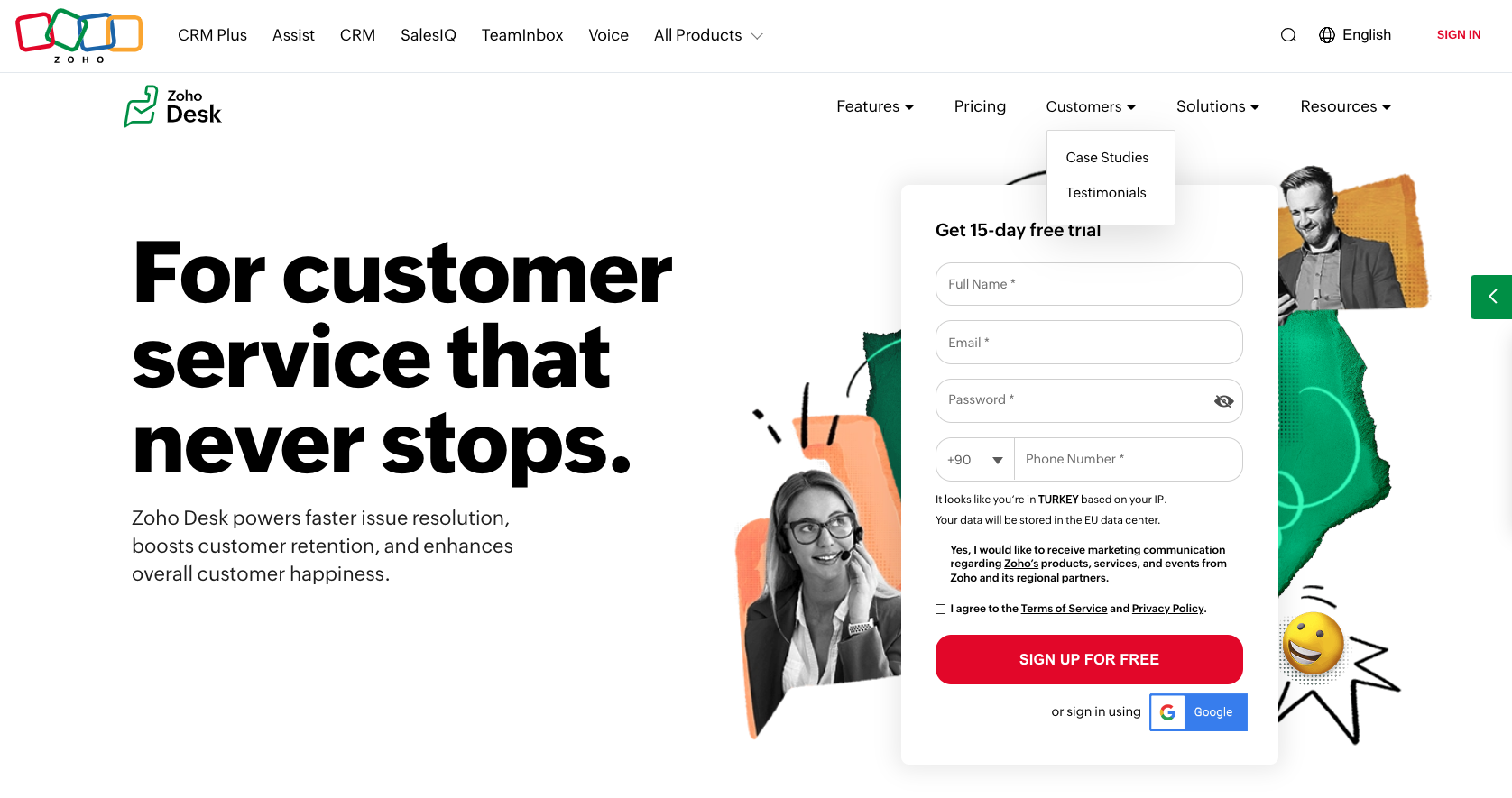
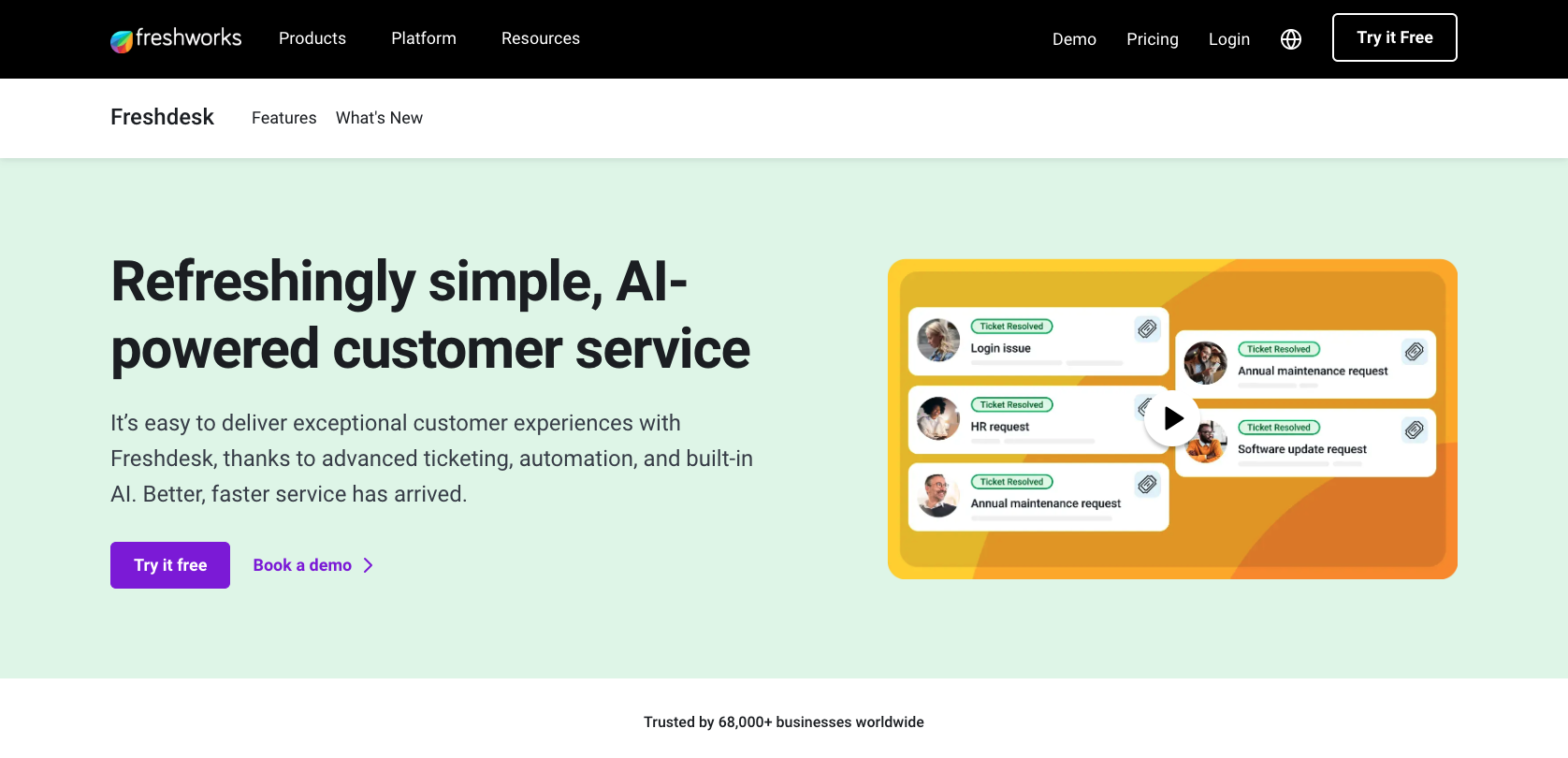
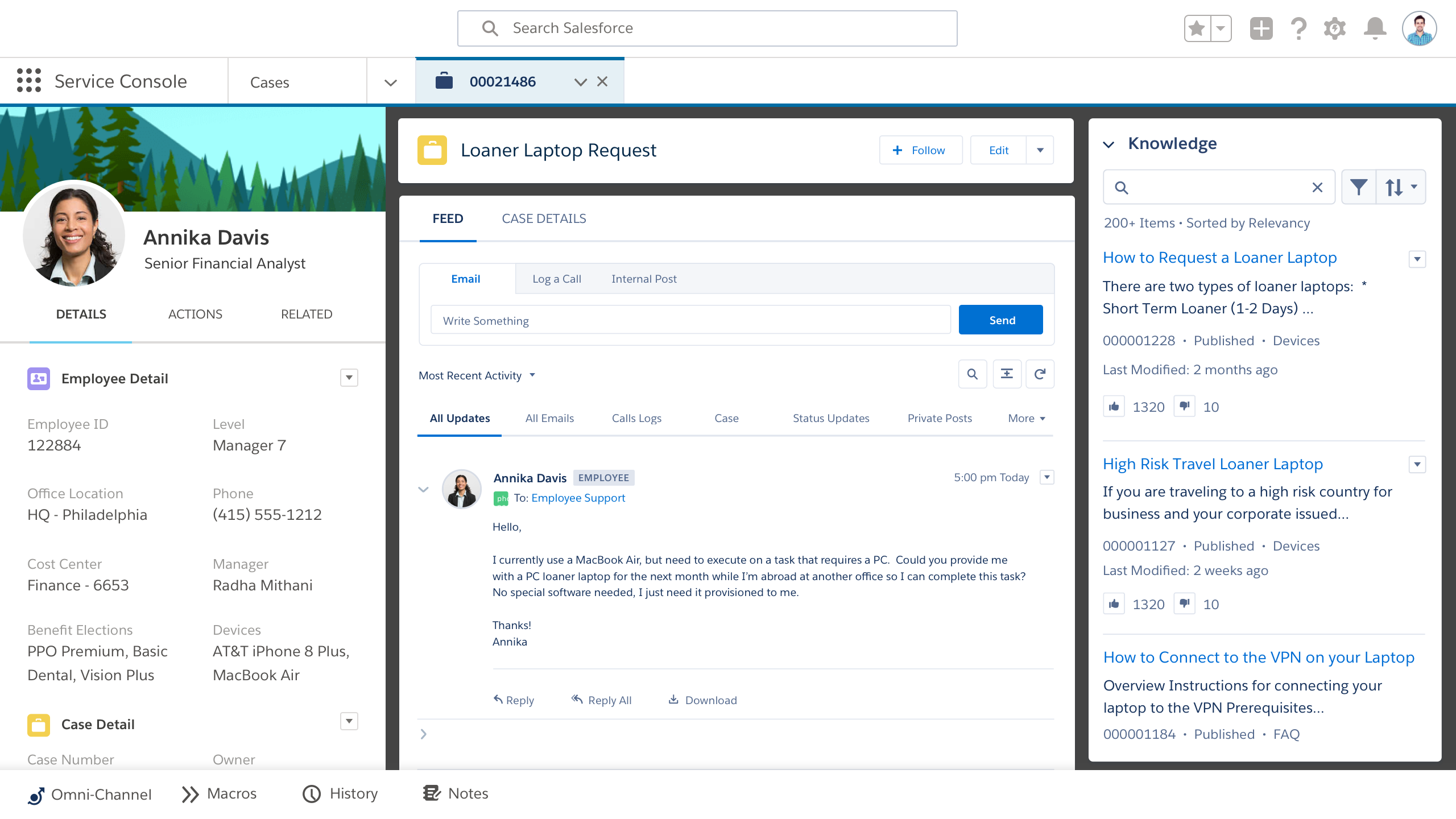
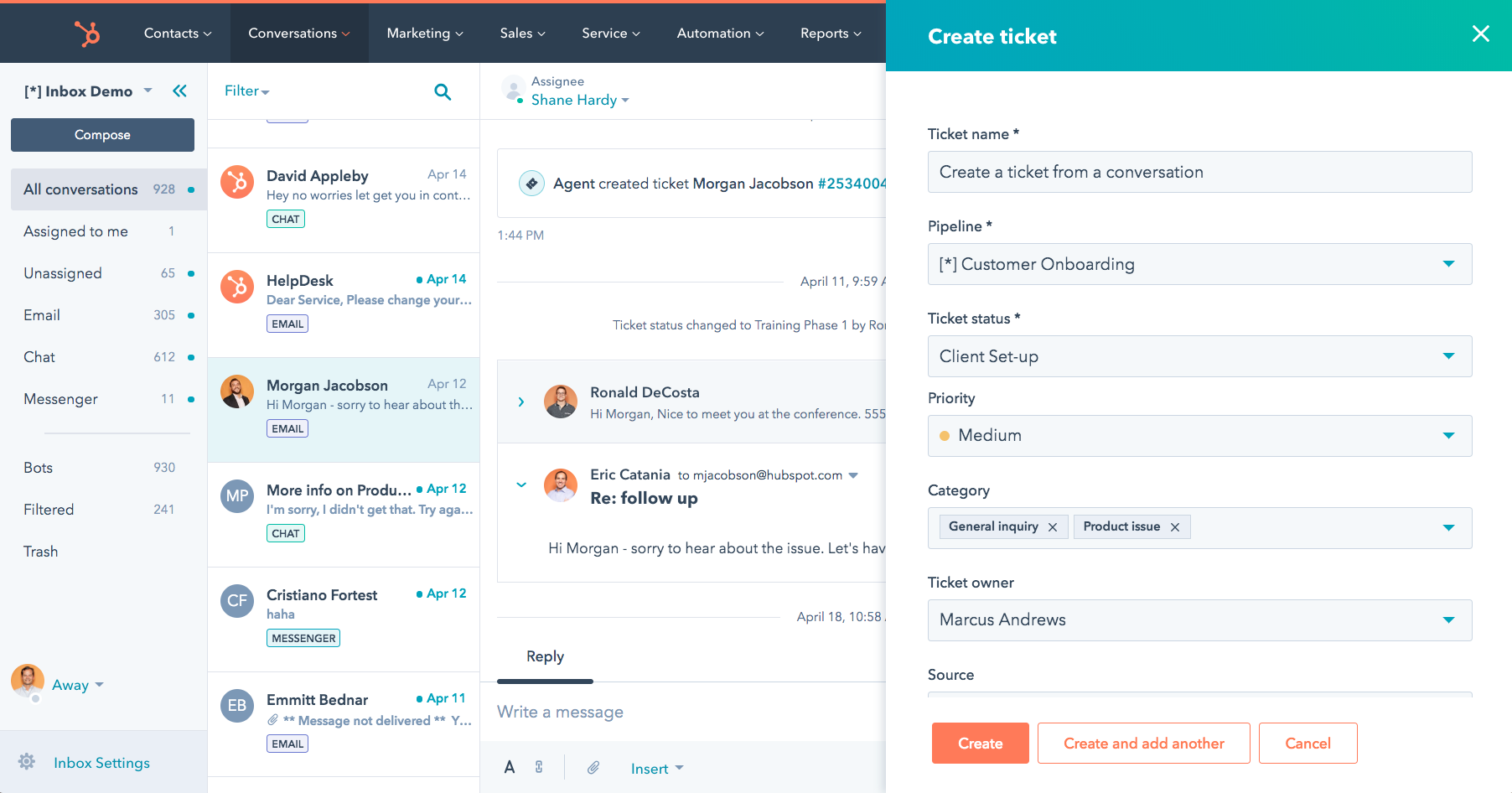
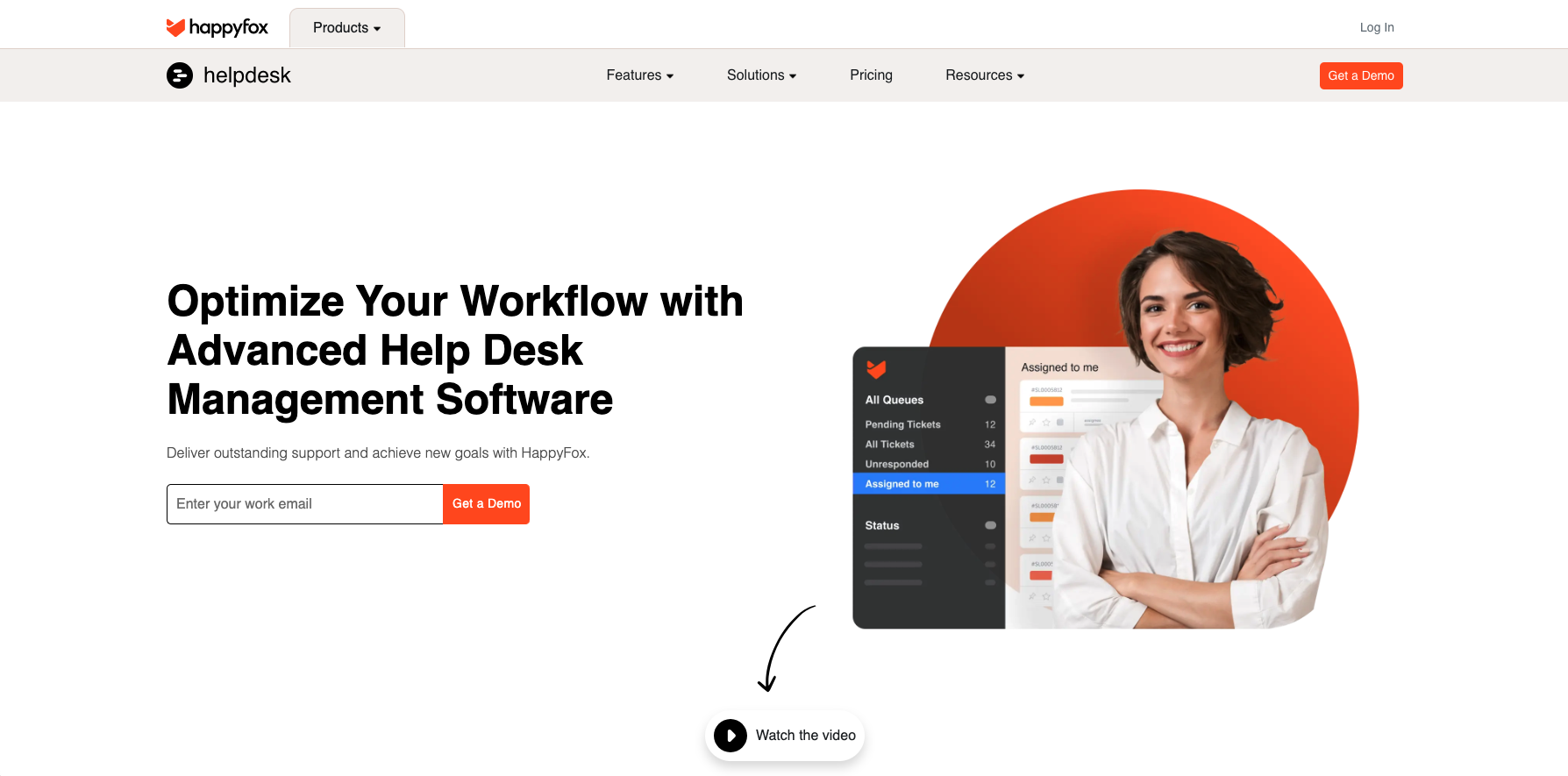
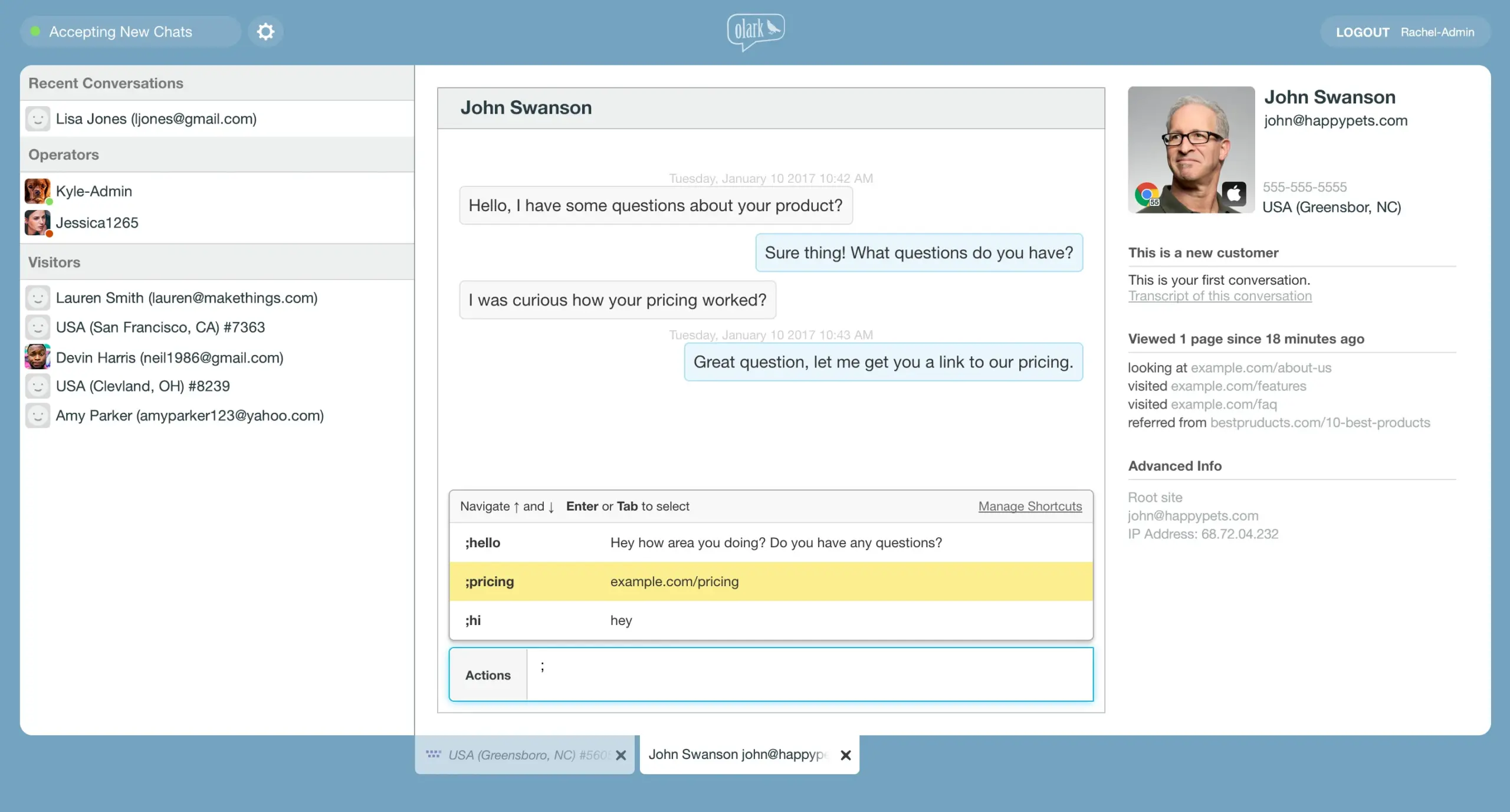
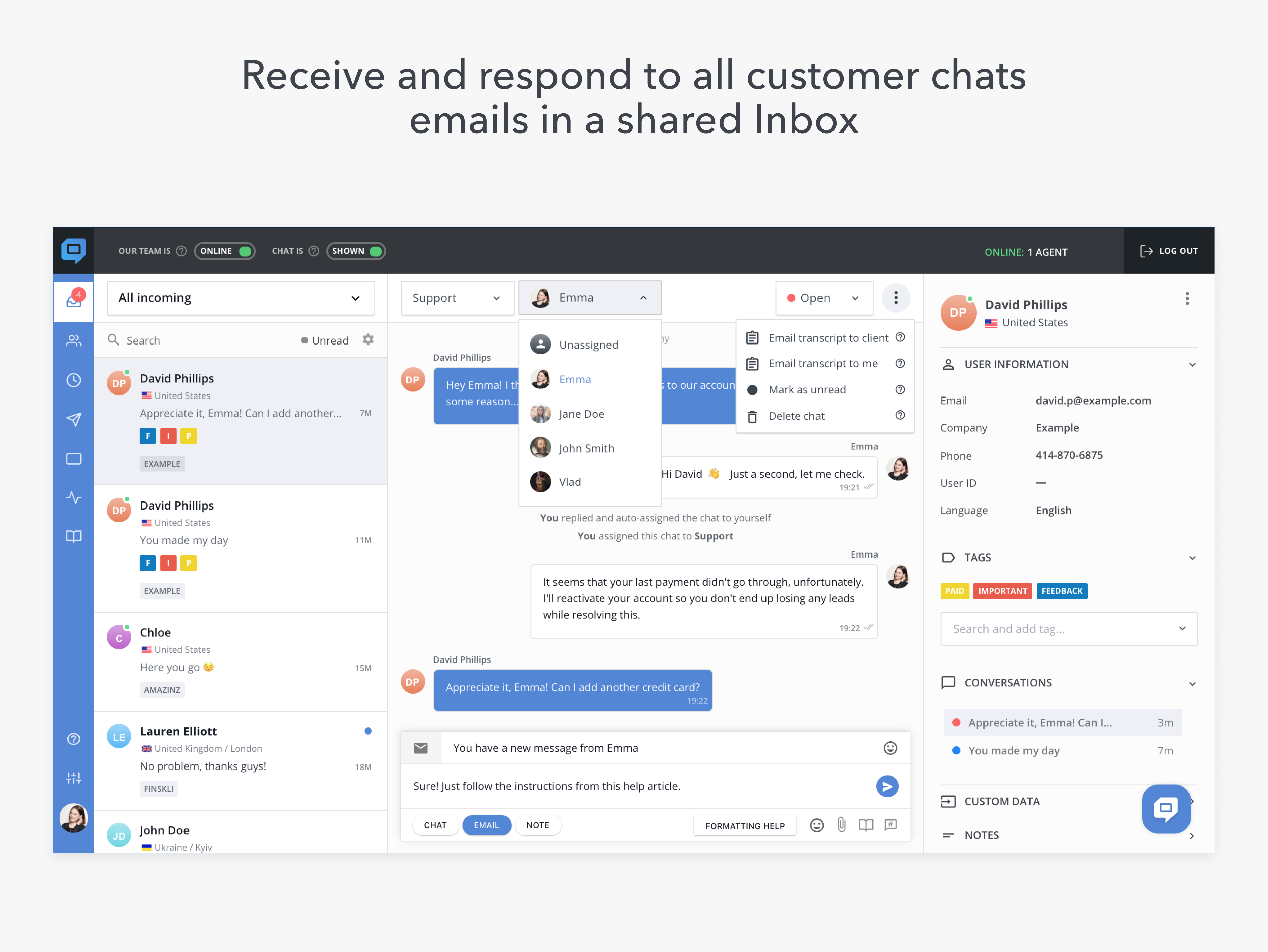

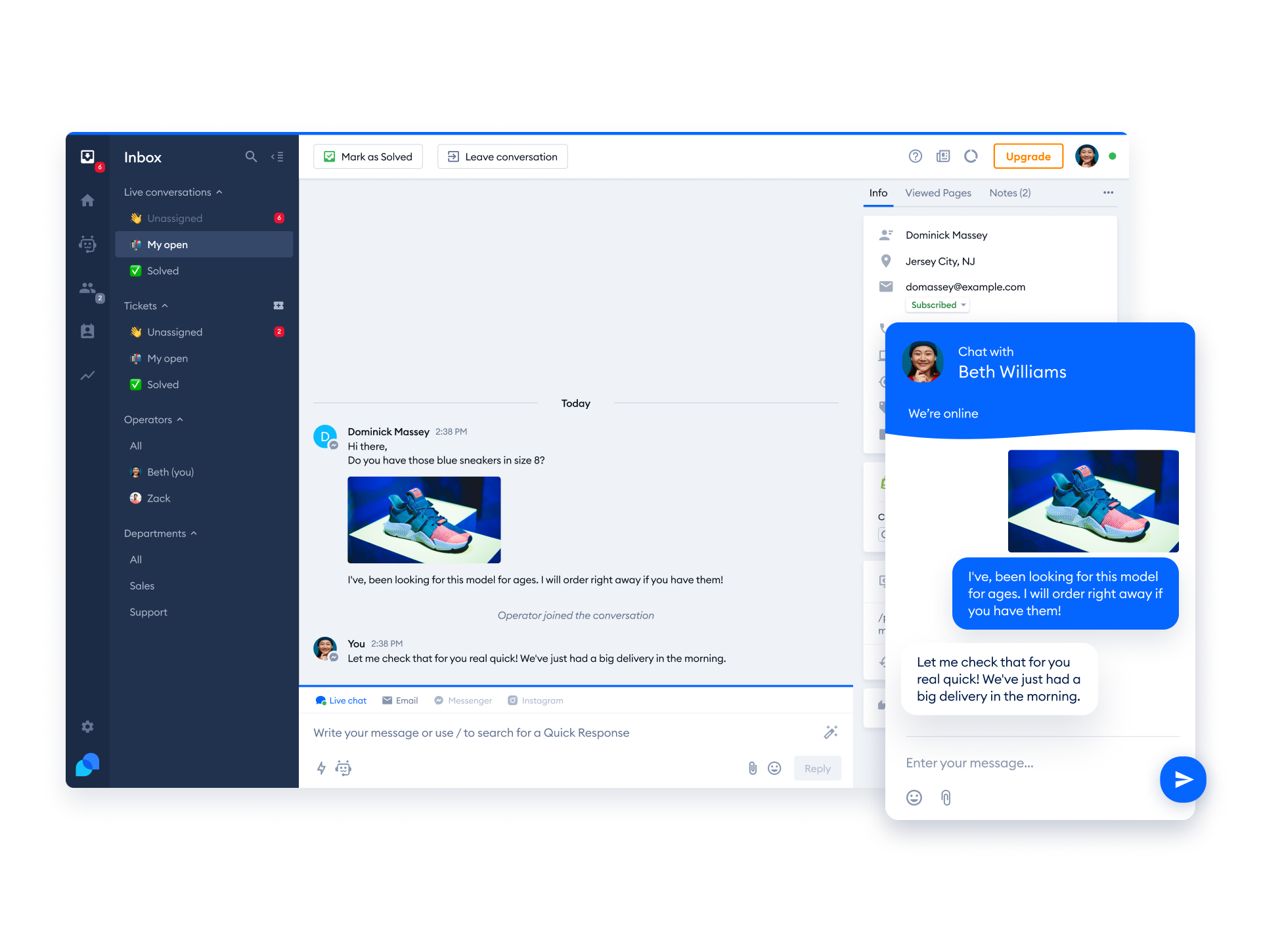
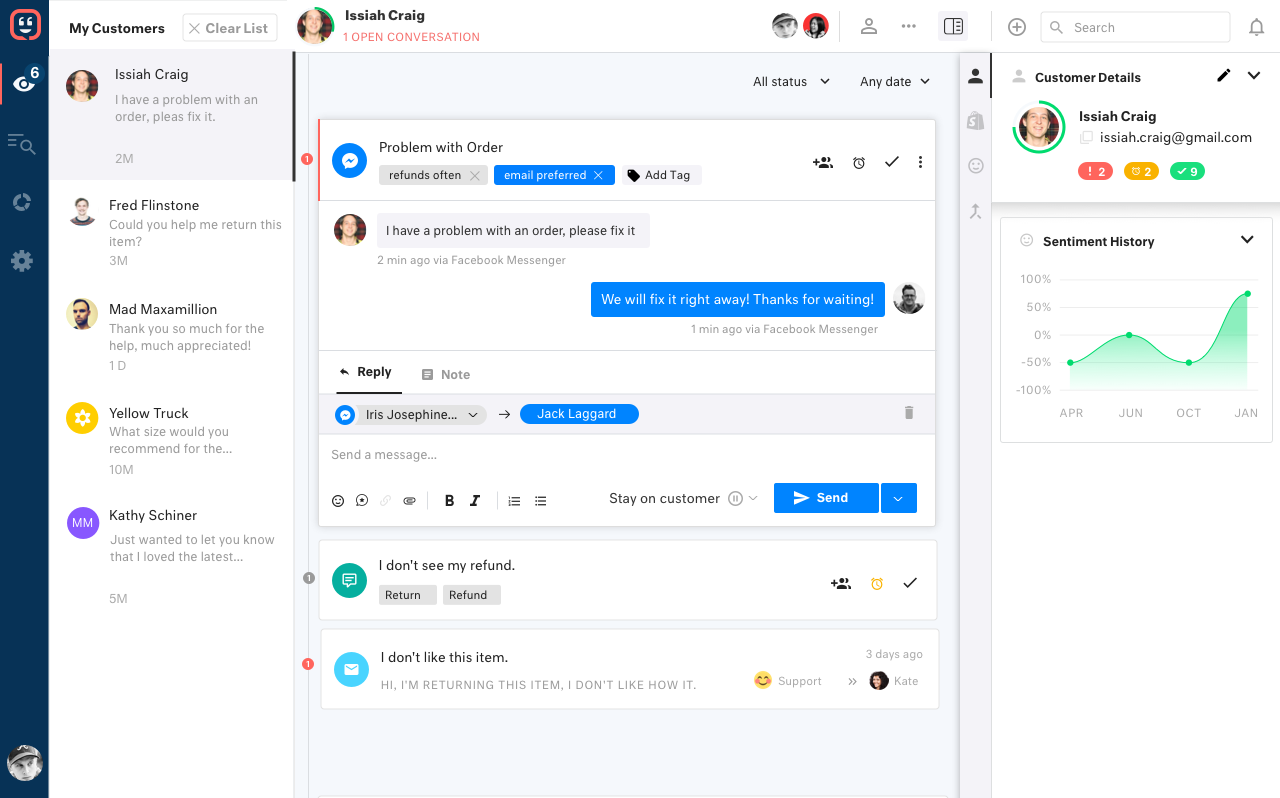



















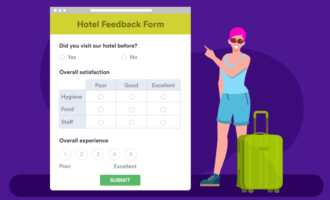
Send Comment: